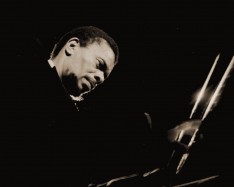Horace Tapscott; Musical Griot

Horace Tapscott: Musical Griot
Los Angeles Filmforum at MOCA
Horace Tapscott; Musical Griot
In Person: Director Barbara McCullough
MOCA Grand Avenue, Ahmanson Auditorium, 250 South Grand Avenue, Los Angeles, CA 90012
Barbara McCullough‘s newest film, HORACE TAPSCOTT: MUSICAL GRIOT, is a profound meditation on the importance of the black tradition to the music, art, history, and activism of Los Angeles and beyond. Horace Tapscott was an underappreciated musical genius and community activist deeply involved in one the most exciting periods of Los Angeles jazz history. Black-listed in the 1960s and ‘70s because of his political affiliations (his “Arkestra” was the band of choice to perform at political rallies), during the Watts Rebellion of 1965, police actually shut down his performances, accusing him of inciting people to riot with his music. HORACE TAPSCOTT: MUSICAL GRIOT tells his story in the manner of a griot, or story-teller, who in West African societies maintain the legacy, knowledge, and history of their group traditions in oral form. McCullough will be present to introduce and discuss the film.
INFO 213/621-1745 or education@moca.org
TICKETS $15 general admission, $8 students with ID, $10 senior (65+)
FREE for MOCA & Los Angeles Filmforum members; must present current membership card to claim free tickets.
Tickets available in advance at http://www.brownpapertickets.com/event/258310
Biography:
A native of New Orleans, Barbara McCullough spent most of her life in the Los Angeles area. Before documentaries, experimental film and video were her first love as she strove to “tap the spirit and richness of her community by exposing its magic, touching its textures and trampling old stereotypes while revealing the untold stories reflective of African American life.” Her film and video projects include: Water Ritual #1: An Urban Rite of Purification, Shopping Bag Spirits and Freeway Fetishes: Reflection on Ritual Space, Fragments, and The World Saxophone Quartet. Her works are screened in museums and galleries nationally and internationally.
Acknowledgements:
Los Angeles Filmforum at MOCA is supported through both organizations by the Los Angeles County Board of Supervisors through the Los Angeles County Arts Commission. Additional support of Filmforum's screening series comes from Bloomberg Philanthropies and the Department of Cultural Affairs, City of Los Angeles. We also depend on our members, ticket buyers, and individual donors.
Los Angeles Filmforum at MOCA furthers MOCA’s mission to question and adapt to the changing definitions of art and to care for the urgency of contemporary expression with bimonthly screenings of film and video organized and co-presented by Los Angeles Filmforum—the city’s longest-running organization dedicated to weekly screenings of experimental film, documentaries, video art, and experimental animation.
For more on Los Angeles Filmforum, visit lafilmforum.org, or email lafilmforum@yahoo.com.
For more information on The Museum of Contemporary Art, Los Angeles, visit moca.org.

HORACE TAPSCOTT: MUSICAL GRIOT
HORACE TAPSCOTT: MUSICAL GRIOT
By Barbara McCullough
16mm to HD, color, sound, 72 minutes, 2017.
Producer: Chephren Rasika
Editor: Scott Brock
Cinematography: Johnny Simmons, Al Santana, Charles Burnett, Bernard Nicola
Nearly four decades in the making, Barbara McCullough’s new documentary is a vivid recounting of the life and times of Horace Tapscott, musical genius, composer, community activist, and jazz mentor. Born in Houston, Tapscott migrated to Los Angeles where he attended Jefferson High School and there met his mentor, Professor Samuel Brown. Tapscott made a serious commitment to Brown that he would pass on whatever knowledge he received to help preserve the art form. At Jefferson, he also met fellow musicians who became well known later in life; in addition to Tapscott’s own voice, jazz icons Don Cherry and Arthur Blythe share their reflections on the richness of their music heritage. Though blacklisted for his political affiliations, Tapscott continued to create and play music that was both for his community and reflective of it. Choosing always to remain in Los Angeles, where he composed, performed, and shared his wisdom on music and life, he mentored three generations of accomplished jazz musicians. Beautifully photographed by many of McCullough’s colleagues in the celebrated Los Angeles Rebellion—including Charles Burnett, Julie Dash, and Billy Woodberry—the film paints a loving portrait of Tapscott and black Los Angeles while capturing remarkable performances by Tapscott with the Pan African Peoples Arkestra.
